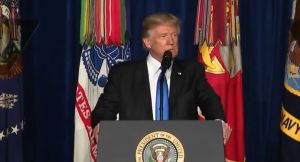nsnbc : After years of deriding the U.S. war in Afghanistan as “complete waste”, U.S. President Donald Trump trumped his previous position and election promises on Monday, when he said he now believes it is in the United States’ interest to remain committed to Afghanistan.
 In an evening address from a military base outside Washington, U.S. President Donald Trump unveiled his administrations new policy without unveiling many details of it. Trump said his policy was base on a “condition-based” approach to defeating terrorism in the country and said the United States will no longer use its military to construct democracies or rebuild other countries in its own image.
In an evening address from a military base outside Washington, U.S. President Donald Trump unveiled his administrations new policy without unveiling many details of it. Trump said his policy was base on a “condition-based” approach to defeating terrorism in the country and said the United States will no longer use its military to construct democracies or rebuild other countries in its own image.
His goal, he said, is to stop the re-emergence of safe havens for terrorists to threaten America and make sure they do not get their hands on nuclear weapons. “We will not talk about numbers of troops or our plans for further military activities,” Trump told about 2,000 service members at Joint Base Myer-Henderson Hall. “Conditions on the ground, not arbitrary timetables will guide our strategy from now on. America’s enemies must never know our plans or believe they can wait us out. I will not say when we are going to attack, but attack we will.”
Trump has reportedly approved up to 4,000 more U.S. troops in Afghanistan. Currently, there are about 8,400 U.S. troops in Afghanistan. Most are advising Afghan forces, though some are tasked with carrying out counterterrorism operations against groups such as the Taliban or the Islamic State’s Afghan affiliate. That number is down significantly from the height of former President Barack Obama’s troop surge, which saw nearly 100,000 U.S. troops in Afghanistan in August 2010. However, there has also been a significant resurgence of the Taliban and ISIS has entered the Afghan theater since.
Following Trump’s speech, Secretary of State Rex Tillerson released a statement saying: “We stand ready to support peace talks between the Afghan government and the Taliban without preconditions. We look to the international community, particularly Afghanistan’s neighbors, to join us in supporting an Afghan peace process.”
Trump, in his address, put Pakistan on notice. “We have been paying Pakistan billions and billions of dollars at the same time they are housing the very terrorists they are fighting. But that will have to change and that will change immediately,” Trump said. Many perceived Trumps statement to “not allowing terrorists to acquire nuclear weapons” as a reference to Pakistan as well.
The conflict in Afghanistan, a country with a factionalized unity government, with former war lords holding key government positions, and riddled with systemic corruption, has dragged on for 16 years. It is becoming the longest U.S. war ever, since the September 11, 2001 “incidents” in the United States. It is worth noting that a growing number of U.S. Americans no longer believe in the “official narrative” about the events on 9/11 and would like to see an independent investigation.
Expressing frustration Trump informed Afghanistan that the commitment by the United States is not unlimited and America’s support not a blank check. The American people, he warned, expect “to see real reforms and real results.” Trump’s policy announcement follows a months long review. However, there are many Afghan politicians including former President Hamid Karzai who are opposed to an increase in troops and who call for a political settlement instead.
U.S. Vice President Mike Pence, at Trump’s request, spoke to Afghanistan President Ashraf Ghani on Monday ahead of the address. Tillerson had spoken over the phone with Pakistani Prime Minister Shahid Khaqan Abbasi, Indian Foreign Minister Sushma Swaraj and Afghan Foreign Minister Salahuddin Rabbani, according to the State Department, about how the United States would like to work with each country to stabilize South Asia through a new, integrated regional strategy.
U.S. generals advised Trump to send several thousand more troops to break the stalemate and retake territory from the Taliban, which controls nearly half the country. Trump was reluctant to commit more troops to Afghanistan – not because of a willingness to facilitate peace with the Taliban, but because of his America first policy. Trump’s decision to trump his previous “the war is a complete waste” policy may have come after Generals and advisers explained the geopolitical value of Afghanistan – and maybe equally importantly – the value of Afghan minerals and other resources. Afghanistan holds one of the world’s largest lithium resources, among others, and Beijing would love to control as many of them as possible.
Defense Jim Mattis, following Trumps speech, said Trump’s strategic guidance came after a rigorous interagency review. “I have directed the Chairman of the Joint Chiefs of Staff to make preparations to carry out the president’s strategy,” Mattis said in a statement. “I will be in consultation with the secretary-general of NATO and our allies — several of which have also committed to increasing their troop numbers. Together, we will assist the Afghan security forces to destroy the terrorist hub.”
CH/L – nsnbc 22.08.2017
Source Article from https://nsnbc.me/2017/08/22/85699/
Related posts:
Views: 0
 RSS Feed
RSS Feed















 August 22nd, 2017
August 22nd, 2017  Awake Goy
Awake Goy 










 Posted in
Posted in  Tags:
Tags: 
















